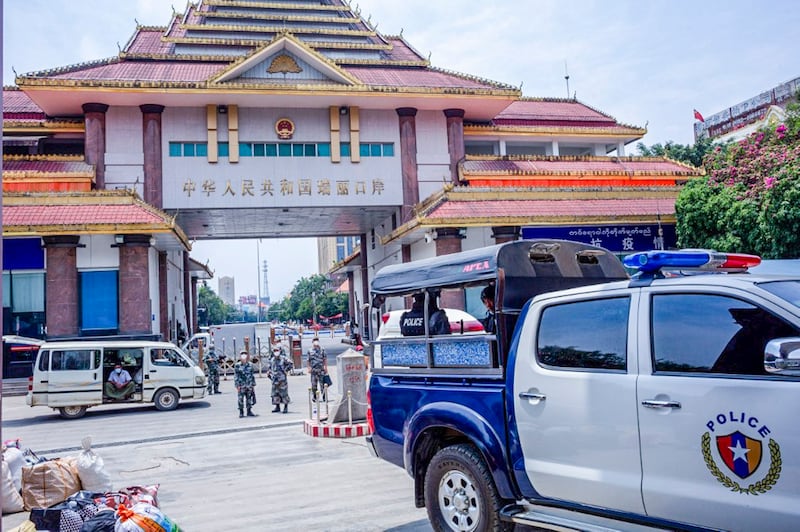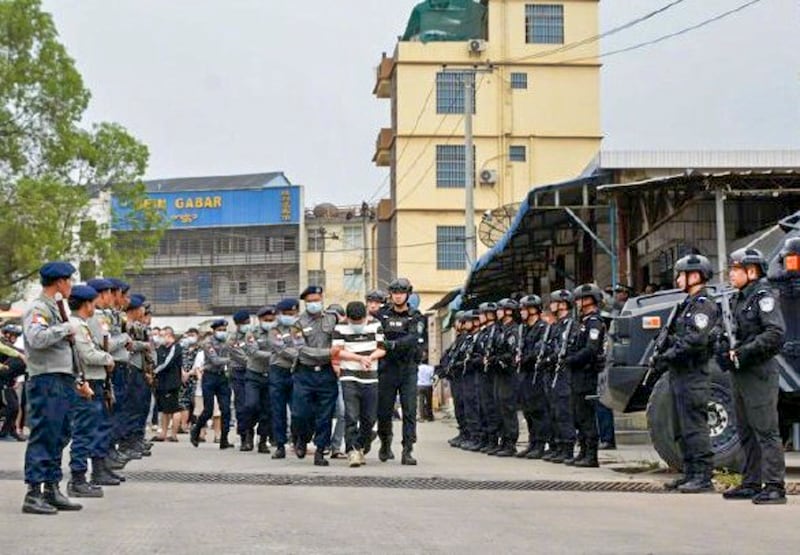Updated at 4:50 pm ET on April 2, 2024
A Chinese official met with junta leader Senior Gen. Min Aung Hlaing to discuss cooperation between Myanmar and China, according to the Global New Light of Myanmar, a junta-backed newspaper.
The meeting came as a joint force of police from Myanmar and China raided several online scam centers in a border town in Myanmar’s Shan state, arresting more than 800 people, including Chinese nationals, according to pro-junta media reports.
Senior Gen. Min Aung Hlaing hosted China Ministry of Foreign Affairs special envoy Deng Xijun in Naypyidaw on Monday to discuss the issues complicating China and Myanmar’s border relationship.
Deng Xijun came to Naypyidaw because border gates have still not reopened due to increased fighting, political and military analysts told Radio Free Asia.
Since China brokered a ceasefire between allied rebel groups called the Three Brotherhood Alliance on Jan. 11, other anti-junta groups have increased their efforts to seize junta-controlled territory. The Kachin Independence Army, which is not part of the alliance, captured nearly 60 junta camps in March and gained control of a partial border trading route and another major highway in Myanmar's northern Kachin state.
A former military officer who did not want to be named for security reasons said re-opening these gates in northern Shan state is vitally important to both the junta and China, as is preventing the Kachin Independence Army from getting closer with the U.S.
"Of course, they want to re-open the border gates. Yunnan's exports are mainly to Myanmar, but it is very difficult to reach an agreement,” he said. “Another point is that both governments have to prevent [the Kachin Independence Army] from being close to the U.S. So they often meet and discuss this.”

On Thursday, American foreign policy director Derek Chollet announced on social media that he met several armed group leaders, including representatives from the Kachin Independence Army.
Border Stability
Fighting between the Kachin Independence Army and junta has raged since Wednesday, when the rebel group began attacking junta camps and highways near Lwegel, a Kachin town directly on the Chinese border.
Three hundred junta soldiers, administrative staff and families of both trapped by fighting attempted to seek refuge in China on Friday, but were refused by Chinese border officials, said Lwegel residents. RFA contacted Yangon’s Chinese Embassy and junta officials to verify this case, but received no response by the time of publication.
Further to the south in Shan state, dozens of casinos notorious for trafficking Chinese citizens into forced labor have sprung up in border areas like Muse. Eliminating these scam centers is one of the few common interests of the junta and rebel groups, which have deported a combined total of over 50,000 Chinese nationals between October 2023 and March 2024 for illegal activity.
Scam centers have plagued the border areas of Thailand, Myanmar and China as nationals from all three countries are tricked into – and subsequently enslaved in – online fraud.
The businesses typically force trafficked workers to call people across Asia and convince them to deposit money in fake or fraudulent investments.
Muse raids
On Monday, pro-junta media reported that a joint force of police from China and Myanmar raided online scam centers in four wards of Shan’s Muse township, arresting 838 people, including 352 Chinese nationals.
Among the Chinese nationals, more than 50 were “ringleaders” and fugitives, the reports said, citing a statement by Chinese officials. Authorities began deporting the 352 Chinese nationals through the Mant Wane border gate in Muse on March 29, the reports said, without providing details of what had happened to the others swept up in the sting.
One resident of Muse who, like others interviewed for this report, spoke on condition of anonymity due to security concerns, told RFA Burmese that the raids took place on three consecutive days, beginning on March 27 and “were carried out secretly."
But another resident of Muse said that some Myanmar nationals were “notified of the raids ahead of time” and were able to flee the area before authorities arrived.
Other residents told RFA that the raids had followed the arrest of 11 people, including the commander of Myanmar’s No. 290 Light Infantry Battalion and the leader of a local pro-junta militia, in the city of Ruili, in China’s Yunnan province. They said the raids in Muse targeted people connected to the 11 arrested in China.
Attempts by RFA to contact Khun Thein Maung, the junta’s economic minister and spokesperson for Shan state, for comment on the recent arrests went unanswered Tuesday.
Chinese pressure
Hla Kyaw Zaw, an expert on Chinese affairs, noted that China has pressured the junta to arrest Chinese criminals on the Myanmar side of the border since the start of the conflict in Shan state, but authorities “took bribes” to ignore the requests.
“They weren’t interested in taking action against these gangs before an armed rebellion took place in the country,” he said.
“But the military truly fears cooperation between the ethnic armed groups and the [anti-junta] People’s Defense Forces … so now they are attempting to appease China.”

Political commentator Than Soe Naing told RFA it would be difficult for Deng Xijun and junta forces in Naypyidaw to attempt to end the conflict in Kachin state.
"China's pressure will have some effect on the [Kachin Independence Army] because their base is on the border. But they are not following everything China says,” Than Soe Naing said. “So I think that it will not be very easy if they agree to the peace process like the rest of the armed groups.”
The Chinese military will conduct a two-day live-fire exercise on Tuesday and Wednesday near its border with Myanmar, Dehong Dai and Jingpo prefectures in Yunnan announced on Monday.
Translated by Kalyar Lwin and Aung Naing. Edited by Kiana Duncan, Mike Firn and Joshua Lipes.
This story has been updated to include details of joint China-Myanmar raids on online scam centers in Shan state's Muse township.

